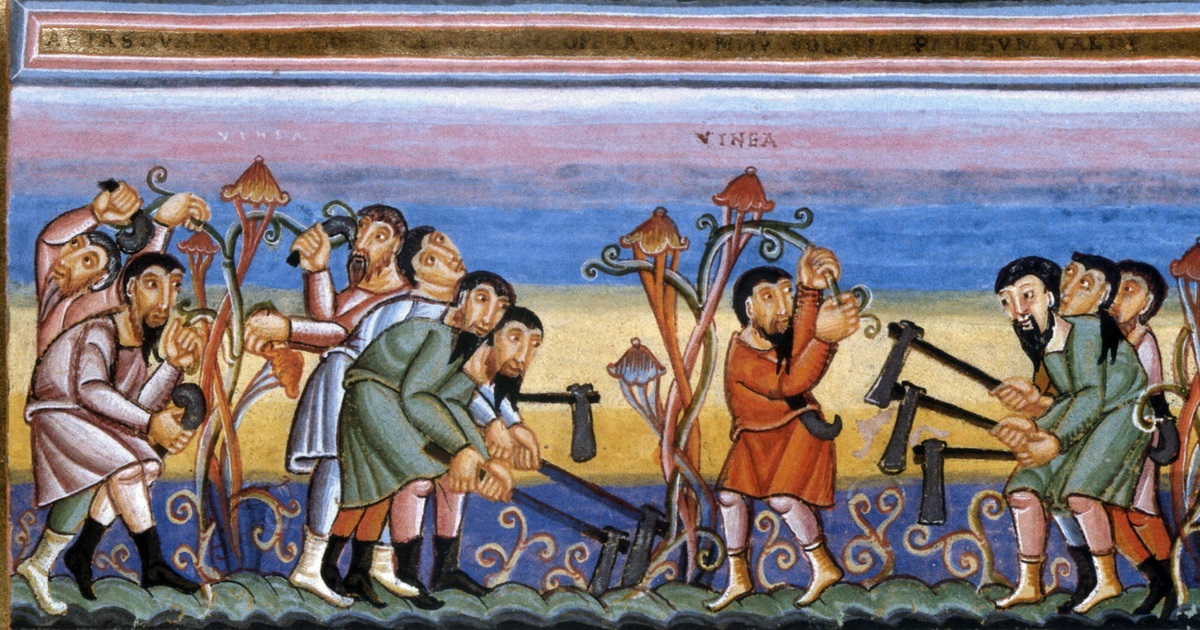
In this mini-series, pastor-scholar Todd Chipman walks us through 5 psalms for Holy Week. Each post is based on his Scripture Storyline: An Invitation to Biblical Theology (Fontes, 2020).
Jesus and the authors of the New Testament used Psalm 118 to describe the praise Jesus received from those who believed in Him and the opposition Jesus faced from the Jewish leadership. Psalm 118 is a joyous hymn of thanksgiving for victory. The poem is an inclusio, beginning and ending with thanksgiving to God for displaying His eternal love in the moment of need (Ps 118:1, 29). The psalmist was in distress, surrounded by swarming nations that rejected God’s people (Ps 118:5, 10-12, 22).
In his distress, the psalmist called out to the Lord. The psalmist confessed that it was better to take refuge in the Lord than to trust in man or the aid of a foreign alliance (Ps 118:5-9). And the psalmist’s hope was fulfilled. So great was the victory that God’s people rejoiced with the psalmist in the deliverance the Lord had won for His people (Ps 118:19-24). The psalmist asked that the Lord continue to grant His people favor and acclaimed that anyone coming with news of the Lord’s aid was blessed (Ps 118:25-26).
Jesus, the Savior-King
As Jesus journeyed toward Jerusalem, His opponents increasingly sought to thwart His growing popularity. Jesus had become a threat not only to the Jewish leadership but also to Roman officials. In Luke 13:31, some Pharisees approached Jesus and asked Him to go away because Herod wanted to kill Him. Jesus countered that the greater threat for a prophet such as Him was the city of Jerusalem. So long as Jerusalem had an opportunity to kill a prophet, Herod was the lesser worry (Luke 13:34). Jerusalem’s spiritual hardness broke Jesus’ heart. Jesus pronounced judgement on the city and quoted Ps 118:26, prophesying that the people of Jerusalem would not see Him until they said, “Blessed is he who comes in the name of the Lord” (Luke 13:35). When the crowds welcomed Jesus into Jerusalem on Palm Sunday, they shouted Ps 118:25-26, blessing Jesus as the Messiah and King God sent to save His people (Matt 21:9//Mark 11:9-10//Luke 19:38//John 12:13). Despite lacking knowledge of Jesus’ forthcoming death and resurrection, that day the crowds confessed that salvation would be found in Him.
Jesus, the Rejected Cornerstone
The psalmist rejoiced in the great reversal the Lord orchestrated for him and Israel saying, “The stone that the builders rejected has become the cornerstone. This came from the LORD; it is wonderful in our eyes” (Ps 118:22-23). Though powerful nations surrounded the psalmist like bees, the Lord’s right hand struck with power to save His people (Ps 118:12, 15).
While Jesus taught in the temple during the last week of His life, He told the Parable of the Vineyard Owner (Matt 21:33-43//Mark 12:1-11//Luke 20:9-18). Jesus used the parable to describe God’s sovereignty over salvation history and to indict His opponents for their unfaithful stewardship of God’s blessings to Israel. Jesus portrayed God as a vineyard owner who had planted a vineyard and leased it to farmers who would manage it and yield its produce back to God (Ps 80:8-19; Isa 5:1-7). But each time God sent a prophet, Israel rejected him. When God sent His Son, the farmers who had been entrusted with the vineyard knew they had their chance: kill the vineyard owner’s son and the farm would be theirs.
Jesus said that God was going to come and take the farm from them and give it to others. Jesus’ Parable of the Vineyard Owner further incited His opponents to seize Him, confirming Ps 118:22. The great reversal was taking place on two levels. The Jewish leadership was about to reject the stone that would become the cornerstone and the stewardship they enjoyed was about to be taken from them.
When Peter and John stood trial for healing the lame man on the steps of temple, Peter defended their actions by citing Ps 118:22-23 as a reference to Jesus (Acts 4:8-12). Peter recalled for the Jewish leadership that the miracle was performed in the name of Jesus—whom they crucified and whom God raised from the dead. Peter explicitly stated that Jesus was the stone the Jewish leadership despised but the cornerstone of God’s redemptive work through the apostles. Salvation could be found in no other name than the name of Jesus. In 1 Pet 2:4 and 7, Peter stated again that the message of salvation in Jesus was like a stone. Any who, like the Jewish leaders opposing Jesus and the church, rejected Jesus’ message of salvation would be damned. But all those whom God had chosen would understood Jesus to be the cornerstone of God’s redemptive plan.
An Invitation to Biblical Theology
Thanks for journeying through the psalms with us during Holy Week. These reflections have all been based on Todd Chipman’s Scripture Storyline: An Invitation to Biblical Theology. Chipman seeks to provide daily commentary for your daily Bible reading that connects each passage to the entirety of God’s plan as it unfolds throughout Scripture. Grab a copy to enrich your Bible reading, to use for a Bible study, or to study the interconnectedness of God’s Word. Available from Amazon and FontesPress.com.

